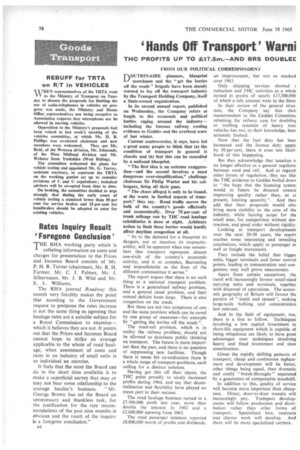'Hands Off Transport' Warni
Page 38

If you've noticed an error in this article please click here to report it so we can fix it.
THC PROFITS UP TO £17.5m.—AND BRS DOUBLEC
FROM OUR POLITICAL CORRESPONDENT nOCTRINAIRE planners, blueprint merchants and the "get the lorries off the roads" brigade have been sternly warned to lay off the transport industry by the Transport Holding Company, itself a State-owned organization.
In its second annual report, published on Wednesday, the Company refers at length to the economic and political battles raging around the industry— including the famous railway costing evidence to Geddes and the overlord scare of last winter.
Current controversies, it says, have led a great many people to think that (a) the condition of transport in general is chaotic and (b) that this can be remedied by a national blueprint.
"The first idea is an extreme exaggeration—and the second involves a most dangerous over-simplification," challenge chairman Sir Philip Warter and his colleagues, firing all their guns.
"The chaos alleged is only to be found, at the worst, in limited aspects of transport," they say. Road ;traffic moves the bulk of the country's goods efficiently and economically. Over 75 per cent of trunk mileage rim by THC road haulage subsidiaries is done at night. Arbitrary action to limit these lorries would hardly affect daytime congestion at all.
" As to the demand for a blueprint its dangers, not to mention its impracticability, will be apparent when one remembers that transport represents almost one-sixth of the country's economic activity, and is as complex, fluctuating and unpredictable as the lives of the different communities it serves."
The report argues that there is no such thing as a national transport problem. There is a generalized railway problem, and a general canal problem, and their annual deficits loom large. There is also congestion on the roads.
But these are not two symptoms of one and the same problem which can be cured by one group of measures—for example by "getting the lorries off the roads ".
The road-rail problem, which is in reality the railway problem, should not be allowed to dominate public thinking on transport. The future is more important than the past, and there is no question of suppressing new facilities. Though there is room for co-ordination there is a whole range of transport problems, each calling for a distinct solution.
Having got this off their chests, the THC point proudly to nicely increased profits during 1964. and say that decentralization and flexibility have played no mean part in their success.
The road haulage business turned in a £7,300,000 profit last year, more than double the amount in 1962 and a £2,600.000 upswing from 1963.
The road passenger interests reported £8,800,000 worth of profits and dividends, an improvement, but not so marked over 1963.
Only shipping services showed E reduction and THC activities as a whols turned in profits of nearly £17,500,000 of which a tidy amount went to the State
In their review of the general situa tion, the Company say that theit memorandum to the Geddes Committes rebutting the railway case for doublinp or trebling taxation of heavy roac vehicles has not, to their knowledge, beer seriously faulted.
Now that the fuel duty has beer increased and the licence duty uppec by 50 per cent, there is even less likeli. hood of this happening.
But they acknowledge that taxation is no longer effective as a general regulatot between road and rail. And as regardi other forms of regulation, they say that the nit evidence to Geddes boiled down to "the hope that the licensing system would in future be directed toward improving quality rather than, as at present, limiting quantity ". And they add that their • proposals would also bring more stability to the core of the industry, while leaving scope for the small man, for competition without destruction, and good order without rigidity.
Looking at transport developments over the next 20-30 years, the repon reaches some interesting and revealing conclusions, which apply to passenger as well as freight movements.
They include the belief that bigget units, bigger terminals and fewer central points, leading to concentration and congestion. may well prove uneconomic.
Apart from certain exceptions, the trend will increasingly favour small-sized carrying units and terminals, together with dispersal of operations. The economic geography of Britain will favour the pattern of "small and spread ", making large-scale hulking and concentration less relevant.
And in the field of equipment, too, there is a line to follow. Techniques involving a low capital investment in short-life equipment which is capable of being ubiquitous are likely to have great advantages over techniques involving heavy and fixed investment and slow amortization.
Given the rapidly shifting patterns of transport, cheap and continuous replacement and development will be better, other things being equal, than dramatic and costly " break-throughs " separated by a generation of comparative standstill.
In addition to this, quality of service will become more important than cheapness. Direct, door-to-door transits will increasingly pay. Transport developments will follow production and distribution rather than other forms of transport. Specialized hire, contracts and charter work will develop. And there will be more specialized carriers.




































































































































